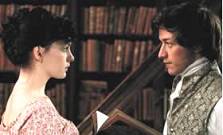|
|
||||
|
|
by Donald Levit  One can appreciate Julian Jarrold’s romance, Becoming Jane, without knowing anything about the writings of Jane Austen or the speculation about her hidden life. Among the great novelists for her vision, precision, craft and tone, with side trips to Bath and London she painted on the miniaturist canvas of her native rural Hampshire, ignored momentous contemporary wars and politics, and self-admittedly explored twinned themes of love and money, only half-ironically wondering what else there was. That, of two girls among eight children, neither the authoress nor beloved older sister Cassandra ever came close to marriage after the death of the latter’s pastor fiancé, has led to intense guesswork. As with the literary remains of In keeping with the arch playfulness of Austen herself, and sneaking in literary references that are fun if caught but not fatal if missed, Sarah Williams and Kevin Hood’s script seizes upon two short references among the sisters’ letters -- from which Cassandra mysteriously destroyed three years’ worth -- to imagine a what-if romance that might have been the missing link of experience that informed the six novels and other pieces. Pure balderdash bluff or food for thought, the result has the charm of the best of a number of screen adaptations of the novels in today’s “Jane Austen moment”-- even to a Bollywoodized Bride & Prejudice -- and way surpasses the confused 1980 fiction that was Jane Austen in Manhattan. Filmed in daylight effect or sometimes only centerlit torch or candelabra interiors, it appears generally period-faithful, shot in Wisley reverses field to show his mettle, whereas at twenty Jane is made of such admirable staunch stuff from the start that her brief time of hopeful passion seems a girlish fall from dignity. Determined to make her own way, by the pen if possible, she is not a woman’s libber but, rather, just herself in an Not so poor in fact as in film, Jane’s screen parents reflect many of her fictions, the clergyman father (James Cromwell) quietly patient while mother (Julie Walters) pushes her daughters toward prosperous bachelors. Cassandra (Anna Maxwell Martin) safely engaged and son Henry (Joe Anderson) nearly all set in the military (and in the eyes of wealthy, somewhat older exile Eliza de Feuillide, played by Lucy Cohu), Mrs. Austen throws Jane in the way of Wisley, nephew and heir of snooty childless Lady Gresham (Maggie Smith). Banished for a spell from Love blossoms into the passion that scholars and biographers have searched for in Austen’s real life. But Tom is penniless, with others depending on him, and, though a woman, Jane is not much better off and has her mother and society’s expectations to contend with. Historically unprovable, in any event, the screen resolution takes the (Released by Miramax Films and rated "PG" for brief nudity and mild language.) |
||
|
© 2024 - ReelTalk Movie Reviews Website designed by Dot Pitch Studios, LLC |



